Robin Helweg-Larsen's Blog, page 20
November 18, 2024
Terza Rima: Louise Walker, ‘The Swing’
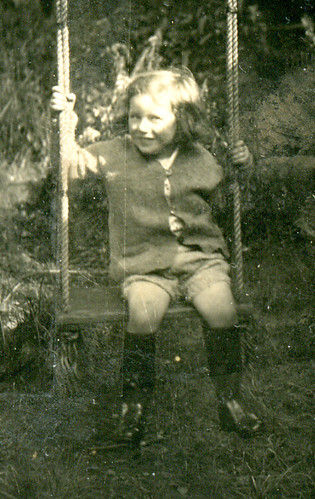
I hold you on my lap; I think you’re dead.
Next to us hangs a rusty, creaking swing.
I look down as my white dress blooms with red.
Such fun to pull the seat right back, then fling
it free. You’re two, I’m four, so I’m to blame;
now I’m screaming bloody murder to bring
someone to the garden to witness my shame
where swaying grimly like a tolling bell
the swing is the proof of the deadly game.
It’s a story my mother liked to tell
while tracing the faint white mark on your brow:
how she found me soothing you after you fell.
The truth is, I can’t remember why or how
I hurled that dead weight directly at you.
Did she wonder at all, as I do now
if I pushed it so hard because I knew
the swing’s unpredictable to and fro
showed love and jealousy can both be true?
You never reproached me, but even so
I still bear the scar of that reckless throw.
*****
Louise Walker writes: “The Swing was my second effort at writing a poem in terza rima; my first was a complete disaster, written in response to an assignment set by Cahal Dallat during a course I did with Coffee-House Poetry earlier this year. That novice attempt followed the rules of the form perfectly, with 3-line stanzas rhyming aba bcb cdc ded efe fgf gg. However, my poem was pompous, stilted and vacuous. It also took me an entire day. The next morning, a memory from early childhood came to me and I thought I would try terza rima one more time. To my surprise (and joy!) the poem called ‘The Swing’ came very quickly, was a pleasure to write and didn’t require my usual endless revisions and tweakings. What’s more, I found that the terza rima form became a little engine for generating my poem – for example, searching for a rhyme for ‘you’ threw up the word ‘fro’ which made think of the swing as a metaphor for the oscillating feelings of a child when a younger sibling arrives. I also found that the chain-like effect of the form, swinging back for rhymes, and then forward, suited the subject matter perfectly. Deep in my subconscious, the terza rima form had been working its magic overnight!
I was not at all delighted to get the terza rima assignment at first, but I learnt such a valuable lesson: sometimes one has to write a really bad poem to be able to write a decent one. ‘The Swing’ became an important poem in my recent debut collection ‘From Here to There’ published by Dithering Chaps, which has at its core my journey from childhood, through the death of my brother in our twenties, then onwards.”
Louise Walker was born in Southport and now lives in London. After reading English at Magdalen College, Oxford, where she was a member of the Florio Society, she taught English for 35 years at girls’ schools. Her work has been published in journals such as Acumen, Oxford Poetry, South, Prole and Pennine Platform. Highly Commended in the Frosted Fire Firsts Award and longlisted in in The Alchemy Spoon Pamphlet Competition, in 2023 she was shortlisted in the Bedford Competition and won 3rd prize in the Ironbridge Poetry Competition. Commissions include Bampton Classical Opera and Gill Wing Jewellery for their showcase ‘Poetry in Ocean’. She has recently published her debut collection with Dithering Chaps:
https://www.ditheringchaps.com/from-there-to-here
Instagram @louise_walker_poetry
Photo: “The Garden Swing” by theirhistory is licensed under CC BY-NC-SA 2.0.
November 16, 2024
Sonnet: Richard Fleming, ‘Sunny Afternoon’

Book discarded, like excess baggage shed
by someone who has rapidly pushed on
into uncharted regions far ahead,
he sleeps in an old deck chair on the lawn.
Gulls circle, skaters on an ice-blue lake,
while he dreams on, oblivious, his face
unshaded by a hat which, when awake,
he wears with equanimity and grace.
What does he dream? Is the unreal more real
than those pale gulls that spiral high above?
In sleep, has youth returned? No longer frail,
does he relive time when impatient love
was everything and all his heart desired,
before life tricked him, left him old and tired?
*****
Richard Fleming writes: “I suppose Sunny Afternoon reflects my own station in life, that is, drifting steadily towards the end, with the usual collection of regrets that most of us have.”
Richard Fleming is an Irish-born poet (and humorist) currently living in Guernsey, a small island midway between Britain and France. His work has appeared in various magazines, most recently Snakeskin, Bewildering Stories, Lighten Up Online, the Taj Mahal Review and the Potcake Chapbook ‘Lost Love’, and has been broadcast on BBC radio. He has performed at several literary festivals and his latest collection of verse, Stone Witness, features the titular poem commissioned by the BBC for National Poetry Day. He writes in various genres and can be found at www.redhandwriter.blogspot.com or Facebook https://www.facebook.com/richard.fleming.92102564/
Photo: posted by Richard Fleming
November 15, 2024
Sonnet: Eric McHenry, ‘Lives of the Poets’
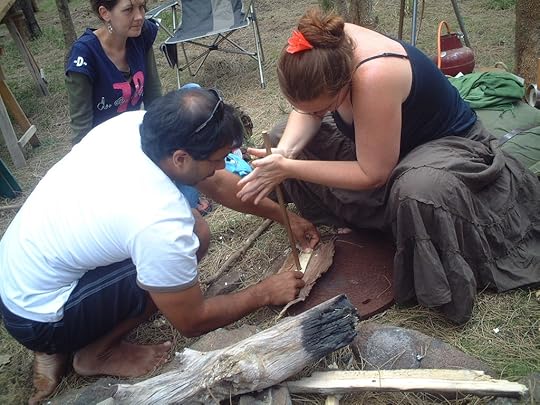
They rubbed two sticks together and made friction.
They made a fist but couldn’t make a hand.
Their dictionary wasn’t made of diction.
Their diction made them hard to understand.
Trying to make a poem, they made a list.
Trying to make the team, they made the choir.
They made up stories whose protagonist
would rub two sticks together and make fire.
Mistakes were made, and mixtapes to go with them.
They made a couch their bed and made their bed.
They tried to make a joke at the expense
of love and money. “Make me,” money said.
They made up stories but they made no sense.
They rubbed two cents together and made rhythm.
*****
Eric McHenry writes: “Strangely, I remember almost nothing about writing this poem, except that I was thinking about the etymology of ‘poet’ (‘maker’) and about the versatility of the verb ‘make’.”
‘Lives of the Poets’ was first published in Literary Matters.
Eric McHenry is a professor of English at Washburn University and a past poet laureate of Kansas. His books of poetry include Odd Evening, a finalist for the Poets’ Prize; Potscrubber Lullabies, which received the Kate Tufts Discovery Award; and Mommy Daddy Evan Sage, a collection of children’s poems illustrated by Nicholas Garland. He lives in Lawrence, Kansas, with his wife and two children.
Eric McHenry – The Waywiser Press
Eric McHenry, Author at The American Scholar
Photo: “Master Sacha twirls the fire stick” by one thousand years is licensed under CC BY 2.0.
November 13, 2024
Sonnet: RHL, ‘Communication Breakdown’

I love you with that love floppy and large,
As one of us a man – the other, dog;
Involved, detached, our life’s a travelogue
Of countrysides seen from a rented barge,
“Travels With You” along some river’s marge,
Failing at interspecies dialogue
Till tries at talk are lost in night and fog,
Drifting with batteries we can’t recharge.
Yet there’s no option but to travel on,
Each varied day no different than before,
Wondering if we’ll find some magic door
Which, risking entry, gives communion;
And if, by talking, love would be enhanced,
Or if we’d then destroy all we have chanced.
*****
Sonnet originally published in Candelabrum in 2007.
Photo: “Accordion player” by eltpics is licensed under CC BY-NC 2.0.
November 11, 2024
Armen Davoudian, ‘Coming Out of the Shower’

I shut my eyes under the scalding stream,
scrubbing off last night’s dream,
when suddenly I hear your voice again
as though it caught in the clogged drain
and was sent bubbling back up from the other
world where you’re not my mother.
This time, it’s really you. I’m really here.
I blink. We do not disappear.
Dad left, you say, to shower at the shop
so I don’t need to stop
just yet—and yet I do, unable to
resume old customs, unlike you.
In a one-bath four-person household, we
learn what we mustn’t see,
growing, in time, so coolly intimate
with one another’s silhouette
behind the opaque frosted shower screen
that once more stands between
us two. While at the mirror you apply
foundation and concealer, I
wash out my hair with rosewater shampoo,
which means I’ll smell like you
all day. Mama, I shout, I’m coming out,
and as you look away I knot
around me tight your lavender robe de chambre,
cinching my waist, and clamber
out of the tub, taking care not to step
outside the cotton mat and drip
on the cracked floor you’ve polished with such zeal
we’re mirrored in each tile.
Yet, you’d forgive spillage, or forget.
What else will you love me despite?
*****
‘Coming Out of the Shower’ by Armen Davoudian is reprinted with permission from Tin House Books from the book The Palace of Forty Pillars (2024). The poem was originally published in Literary Matters.
Armen Davoudian is the author of the poetry collection The Palace of Forty Pillars (Tin House, US; Corsair, UK) and the translator, from Persian, of Hopscotch by Fatemeh Shams (Ugly Duckling Presse, US; Falscrhum, Germany). He grew up in Isfahan, Iran, and is a PhD candidate in English at Stanford University.
“Shower Silhouette” by tausend und eins, fotografie is licensed under CC BY 2.0.
November 9, 2024
Using form: Spenserian sonnet: Charles Martin, ‘On the Problem of Bears’
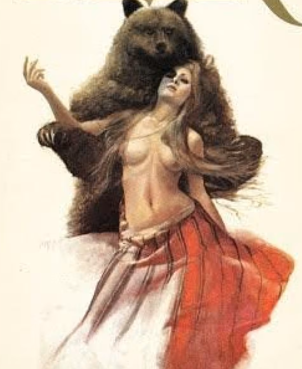
Bears are frustrated by their lack of speech,
Their claws leave blackboards shrieking for repairs,
And that’s why bears are seldom asked to teach
And almost never get Distinguished Chairs
Unless they come across one unawares
Whose rich upholstery they quickly shred.
Some of them have been known to have affairs
With a man or woman lured into their bed—
This often ends up badly with one dead,
The other executed for the crime,
Or given a life sentence in a zoo.
Bears are familiar with existential dread,
Bears put their pants on one leg at a time:
The problems bears have are your problems too.
*****
Charles Martin writes: “The poem is written in a variation on the Spenserian Sonnet form, which I have been writing for several years now. In this case, I enjoy the contrast between the strictness of the form and the raucousness of its subject. As I recall, I began it on a morning walk, and I think finished it shortly after the walk ended.
“The poem will next appear in The Khayyam Suite this spring, published by The Johns Hopkin University Press, which has published my last two collections of poetry, Signs & Wonders and Future Perfect, both of which are still in print. (Future Perfect has a sonnet sequence written in the Spenserian form.) Poems have recently been published in Literary Matters, The Hudson Review, Classical Outlook, and in Best American Poetry, 2024.”
Charles Martin is a recipient of the Harold Morton Landon Award from the Academy of American Poets and an Award for Literature from the American Academy of Arts and Letters.
Photo: from the cover of Marian Engle’s novel ‘Bear’, referenced in https://www.cbc.ca/radio/ideas/why-the-classic-canadian-novel-bear-remains-controversial-and-relevant-1.5865107
November 8, 2024
Morri Creech, ‘Mileage’

The car mechanic’s counting out his bills
behind the E-Z Mart at one a.m.;
he’ll toss rocks at beer bottles just for thrills
until his dealer comes, it’s fine with him.
He draws in a deep breath and sees the light
swerve from the highway, puzzling the back wall
he leans against just to keep out of sight.
A quarter bag and some fentanyl, that’s all.
His phone vibrates again though nothing’s wrong.
For two years he’s been living in a trailer
with a girl who works at Publix. They get along
even if sometimes she says he’s a failure—
what can he say to that? Sure. He lives cheap.
They’ll fight until she forces a decision,
then roll around on the couch. Once she’s asleep
he’ll take a dose and watch some television.
At night he dreams of cylinders and sprockets,
the trucks and cars too busted up to fix;
startled awake, eyes aching in their sockets,
he’ll watch the clock hands grope their way to six.
A car pulls up but he can see it’s not
his hookup. Just kids with nothing else to do
but drink a six-pack in the parking lot
before they head out to the lake to screw.
He had his share of mischief, too, Lord knows.
The girls don’t eye him in the check-out aisle
much anymore, the ones with painted toes.
A few years back, at least, they used to smile.
The boys can see the grease that stains his hands;
they all think, damn, who wants to work that hard?
He spends the day beneath their dads’ sedans
while they play tackle football in the yard.
Chasing a football blew out both his knees
and broke his wrist. That was three years ago.
Customers say, “go Stags,” and toss their keys,
then look at him real close as if they know.
A text says no one’s coming. The BP sign
flickers over the pumps, and though it’s half-
past two now, and he’s tired, he’s feeling fine
enough to think it’s all a bust, and laugh.
And, anyway, it’s good to be alone
with the gas fumes and blinking traffic light
and fifteen missed calls lighting up his phone.
Later, he thinks, once he and his girl fight,
and once she falls asleep on his left arm,
he’ll stare at the divots on the ceiling tile
and wait to hear the clock sound its alarm
while the night’s odometer counts one more mile.
*****
Morri Creech comments: “As Mark Strand once said, I write to find out what I have to say. I don’t start a poem with an idea; I start with a line, an image, a rhetorical stance. Then I write in search of context: how can I situate this in a situation, a narrative moment, an argument, a meditation? The language takes me wherever I end up. This poem was constructed like that. I started with a first line and then wrote toward trying to figure out the context of the line. In this case, it led me to a character sketch. It was fine to discover what this character was about; the decisions I made about his character and circumstances were largely directed by rhymes. They steered me in what I hope was the right direction.”
Morri Creech is the author of five collections of poetry, including the Sleep of Reason, a finalist for the Pulitzer Prize, Blue Rooms, and The Sentence (published by LSU Press, and which includes this poem). A recipient of NEA and Ruth Lilly Fellowships, as well as North Carolina and Louisiana Artists Grants, he teaches at Queens University of Charlotte.
www.morricreech.com
Photo: “Let’s Talk Tires” by gfpeck is licensed under CC BY-ND 2.0.
November 6, 2024
RHL, ‘Fighting with Language’
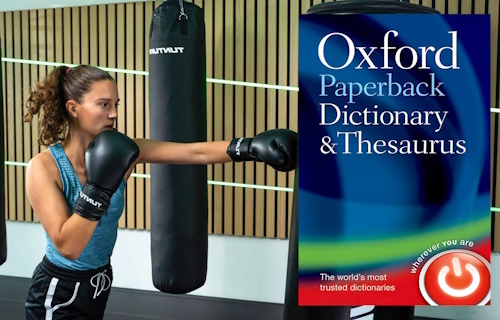
Trap and entangle it,
wrangle it, strangle it,
wrinkle it, rankle it,
manacle, mangle it!
Wrap it, unstrap it,
and rip it and strip it,
then pollard it, top it
and limb it and lop it,
and lift it and drop it
and turn it and flop it.
Then roll it out, slice it thin,
weave about, build it in,
spatter with sparkles and
sprinkle with glitter: you win!
*****
I started this poem in 2008 and abandoned it. Running across it a couple of months ago, I worked on it and sent it in to George Simmers who has just published it in this month’s Snakeskin. Keep your scraps – you may find a use for them in the future!
And by the way: December Snakeskin will be a book fair. Any poets who have published a book or pamphlet of verse over the past year are invited to contact George Simmers: editor@snakeskin.org.uk and if he thinks your book is suitable, he will ask you to send a sample poem, a short introduction and a link to where the book can be bought – and these will go online on December 1st – in time for Christmas shoppers.
Photo: from Snakeskin 322.
November 4, 2024
Using form: Sonnet: Jenna Le, ‘Purses’
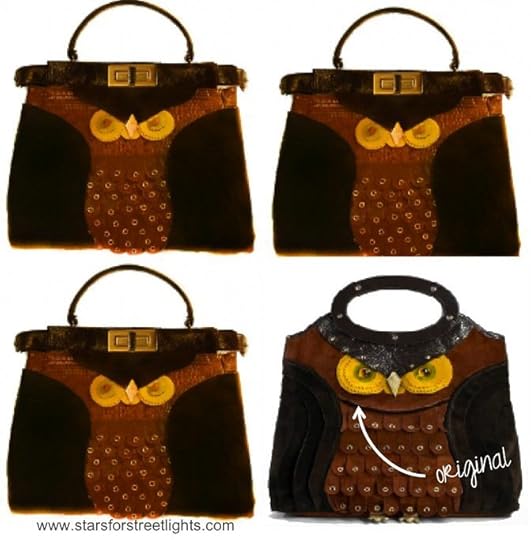
When our Quiz Bowl team of eighteen-year-olds snagged
a berth in the finals, held in New York City,
my small-town Minnesotan brain cells dizzied—
at last I’d be some place that mattered. Swag
was my teammate Anne’s fixation: knockoff bags
peddled in Chinatown, affixed with glitzy
Kate Spade labels. Anne bought a sack of six,
then forgot it on the airport shuttle’s shag
seats; someone swiped it within minutes. Kate,
I learned a fact of womanhood that year:
even we knockoff girls, cheap, desperate
to look like someone else, to imitate
a finer woman, have our value; we’re
wanted, wanted, until we disappear.
*****
Jenna Le writes: “The anecdote narrated in the first ten lines of the poem poured out of me easily and naturally enough. It was an anecdote that had been knocking around inside my brain for many years, but it wasn’t until I sat down to write the poem that the incident’s metaphorical meaning — that is, the epiphany contained in the poem’s last four lines — seemed to crystallize in the air in front of my eyes — and, to me, made the whole poem worthwhile. Honestly, until I sat down to write the poem, it had never even occurred to me that such a slight-seeming anecdote might have any metaphorical meaning at all. I sat down to write the poem more or less on a lark, and then the sonnet form just sort of took over and forced me to look deeper, to see more depth in my own material. This is one of the reasons I love the sonnet form.”
Jenna Le (jennalewriting.com) is the author of three full-length poetry collections, Six Rivers (NYQ Books, 2011), A History of the Cetacean American Diaspora (Indolent Books, 2017), and Manatee Lagoon (Acre Books, 2022), the last of which is the collection in which “Purses” appears and which can be purchased here: https://press.uchicago.edu/ucp/books/book/distributed/M/bo185843950.html
Photo: “DIY Kate Spade Owl Purse” by Stacie Stacie Stacie is licensed under CC BY-SA 2.0.
November 2, 2024
The Two-State Dissolution (3): Smith, Burch, Foster, McCarthy, Helweg-Larsen, Bales

J.D. Smith, ‘Apology in Siege’
I hope you will forgive me
for having given you hope—
Too late for youthful indiscretion, though
I believed my story and felt young in it
until the metal facts fell.
I’d still like to imagine some god
would help, but that line looks broken
like the water, the gas and electricity.
What we have is hours, and in them
you should have the bread and fruit
before they feed the rats.
I am keeping the wine for myself.
It is piss-poor, anyway, and I have
far more to forget.
J.D. Smith, ‘Slant Psalm’
My right hand has never known cunning,
yet I remember thee, O Jerusalem,
not as others’ sacred city
but capital and emblem of loss,
origin of far wandering
without prophecy of return.
My right hand has never known cunning.
May I have, as recompense, forgetting.
Michael R. Burch, ‘Starting from Scratch with Ol’ Scratch’
for the Religious Right
Love, with a small, fatalistic sigh
went to the ovens. Please don’t bother to cry.
You could have saved her, but you were all tied up
complaining about the Jews to Reichmeister Grupp.
Scratch that. You were born after World War II.
You had something more important to do:
while the children of the Nakba were perishing in Gaza
with the complicity of your government, you had a noble cause (a
religious tract against homosexual marriage
and various things gods and evangelists disparage.)
Jesus will grok you? Ah, yes, I’m quite sure!
Your intentions were noble and ineluctably pure.
And what the hell does THE LORD care about Palestinians?
Certainly, Christians were right about serfs, slaves and Indians.
Scratch that. You’re one of the Devil’s minions.
Gail Foster, ‘On The Heights Above Jezreel’
War’s harvest then is of these bitter fruits
Hot shards of shrapnel buried in the flesh
Of children, olives ripped up from the roots
The horrid cries that fly from the nephesh
And blinded eyes. Who benefits from this?
Warmongers, metal forgers, men who plan
Whole cities while still smoking ruins hiss
Black marketeers and strategists. Who can
Sleep peacefully while others have to hide
Their families beneath their mothers’ skirts
And bury them before their tears have dried?
When will this harvest of these bitter hurts
Be over? On the heights above Jezreel
The storm clouds gather. Over soon I feel
Martin McCarthy, ‘The Unkillables’
There’s no great reason here to sing,
but still they sing and play once more …
the filthy, ragged children of the poor,
who shall, as always, inherit nothing.
There’s no beckoning paradise
beyond these war-torn streets of dirt,
where chalked slogans outline their hurt,
and yet, the unkillables rejoice!
Robin Helweg-Larsen, ‘Photo of a Dead Palestinian’
Hard to describe blown-off-ness of a head:
no head, neck, shoulder – only flopping flesh,
unfinished ending of a smooth-limbed, fresh,
strong, naked body on white-sheeted bed;
a tangled, mangled churning; then, instead
of the anticipated face (serene
as marble statue, Christmas figurine)
instead, disorganised meat, spilling red.
No face or brains or hair. We’re sick, confused.
The torn-off torso seems to have the calm
proportions of an adult – look again:
the genitalia of a boy of ten.
“Collateral damage” is the term that’s used.
Beside the body, on the sheet, an arm.
Marcus Bales: Right-Wing Semite-Murderer’s Song
Netanyahu:
I am the very model of a right-wing Semite-murderer,
Since I’m a Semite, too, the thing cannot get much absurderer.
My people were abused by every tribe and nationality,
So I, instead of empathy, embraced provinciality.
Because we were oppressed I’m now oppressing weaker other folks,
It gives me cover that we’re killing our Semitic brother-folks.
It isn’t ethnic cleansing if I swear that in my piety
I’m killing and I’m maiming only folks of my variety.
Nazi Chorus:
It isn’t ethnic cleansing if we swear that in our piety
We’re killing and we’re maiming only folks of our variety.
We’re killing and we’re maiming only folks of our varie- riety.
Netanyahu:
The same way each religion has its zealots kill for true-ishness
Islamic zealots have declared that they’ll erase all Jewishness,
And we have trained our own to act with criminal lethality
To counterbalance enemies of lethal criminality.
Nazi Chorus:
And we have trained our own to act with criminal lethality
To counterbalance enemies of lethal criminality.
To counterbalance enemies of lethal criminali- nality.
Netanyahu:
I play the left against the right. My politics are strenuous.
I say “If you hate one Jew …” Well, the rest is disingenuous.
That propaganda works so well is not much of a mystery
By pointing out how badly Jews were treated throughout history.
We’ve rarely had an easy time, with ghettos, rape, and slavery,
Our holidays still celebrate the mass of unmarked gravery.
But we survived because we had our own ulteriority —
And now we’re in a place at last where I am the authority.
Nazi Chorus:
But we survived because we had our own ulteriority,
And now we’re in a place at last where we are the authority.
And now we’re in a place at last where we are the authori- thority.
Netanyahu:
The Stern Gang and the Irgun were the Hamas of their day and time
They killed and maimed the British, and they justified dismaying crime,
And now my brave Israeli right-wing zealots take that bow for theirs,
And use exactly those excuses Hamas uses now for theirs.
Nazi Chorus:
And now our brave Israeli right-wing zealots take that bow for theirs,
Exactly with the same excuses Hamas uses now for theirs.
Exactly with the same excuses Hamas uses now for now for theirs.
Netanyahu:
When everyone is furious that everyone is furious,
And injury is contemplating things yet more injurious;
When money spent on arms and planning how to break the breakerage
Could buy opponents whole, including buildings, stock, and acreage;
When every group is cheering zealots’ grim religiosity
And everyone is trembling with the fear of new atrocity,
I stay in office by appealing to the prejudicial dumb —
While filling my Swiss bank accounts just like Hamas officialdom.
Nazi Chorus:
I stay in office by appealing to the prejudicial dumb —
While filling my Swiss bank accounts just like Hamas officialdom.
While filling my Swiss bank accounts just like Hamas official- licialdom.
Netanyahu:
No policy’s absurd enough that mine is not absurderer.
I am the very model of a right-wing Semite-murderer.
It isn’t ethnic cleansing if I say that in my piety
I’m killing and I’m maiming only folks of my variety.
Nazi Chorus:
It isn’t ethnic cleansing if we say that in our piety
We’re killing and we’re maiming only folks of our variety.
We’re killing and we’re maiming only folks of our vari- variety.
Robin Helweg-Larsen, ‘Roots of Terrorism’
Step back a moment, and reflect:
not saying that it’s good or right
that chained, starved, beaten dogs would bite–
but what did you expect?
*****
Michael R. Burch, ‘Starting from Scratch with Ol’ Scratch’, first published in The HyperTexts
Martin McCarthy, ‘The Unkillables’, first published in The HyperTexts
Robin Helweg-Larsen, ‘Photo of a Dead Palestinian’ and ‘Roots of Terrorism’ first published in The HyperTexts
Photo: Anadolu Agency photographer Ali Jadallah – Gaza https://x.com/alijadallah66?lang=en
https://www.theguardian.com/world/2024/oct/05/one-year-in-gaza-since-the-7-october-attack-photo-essay



